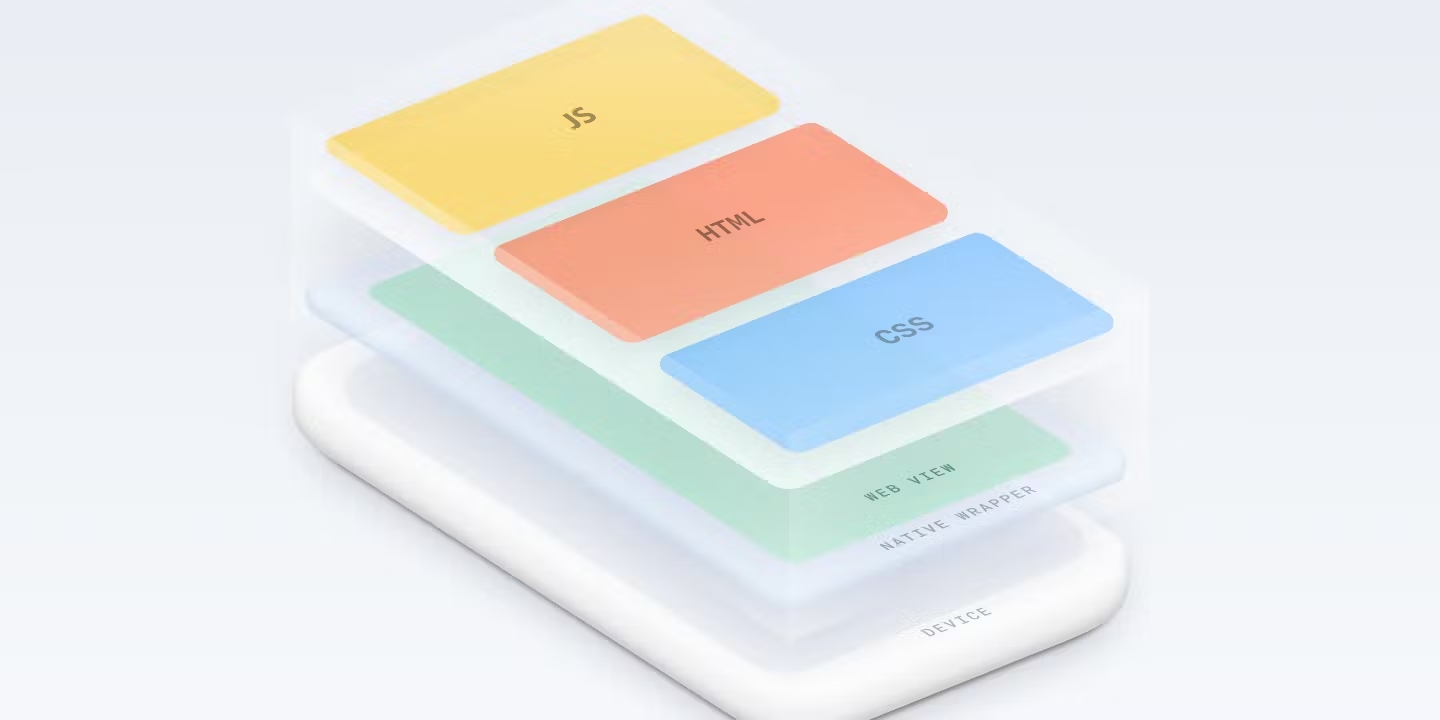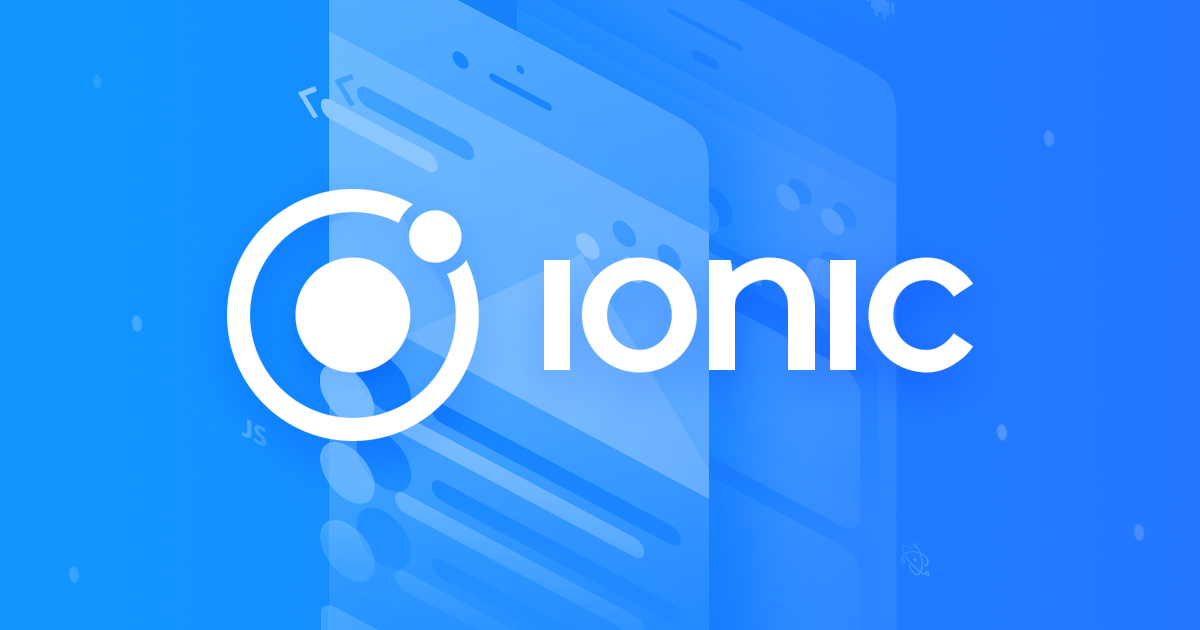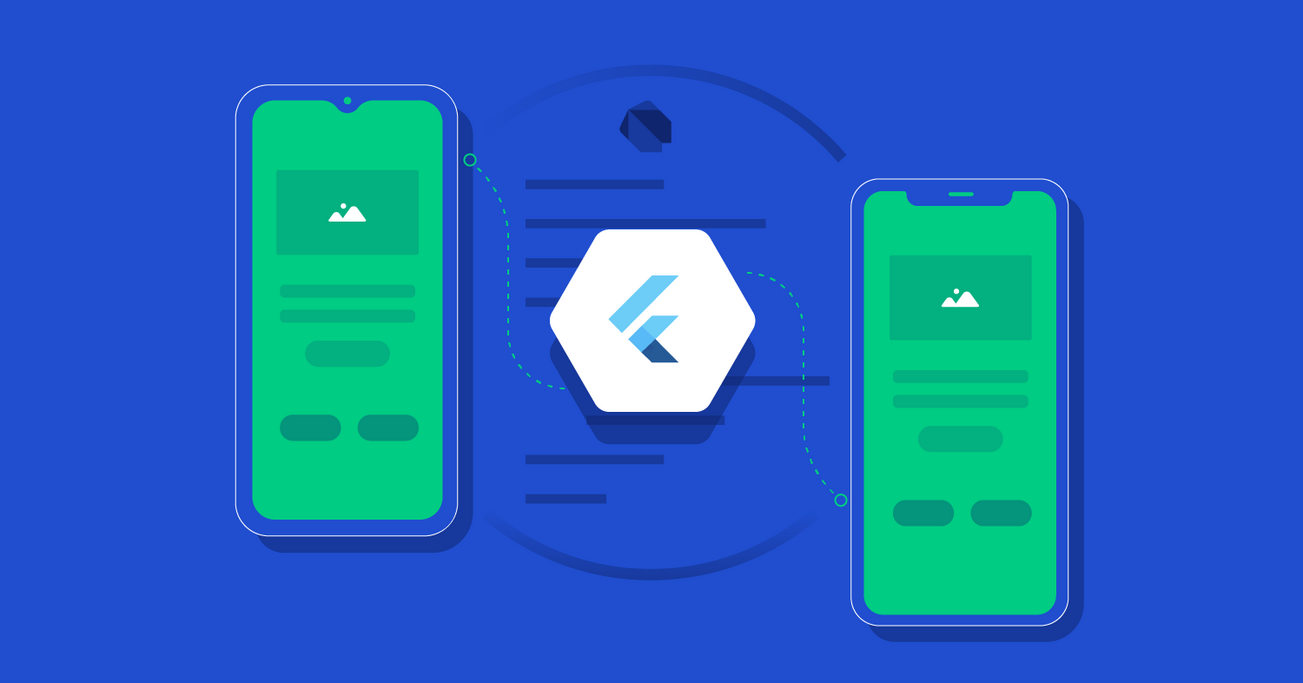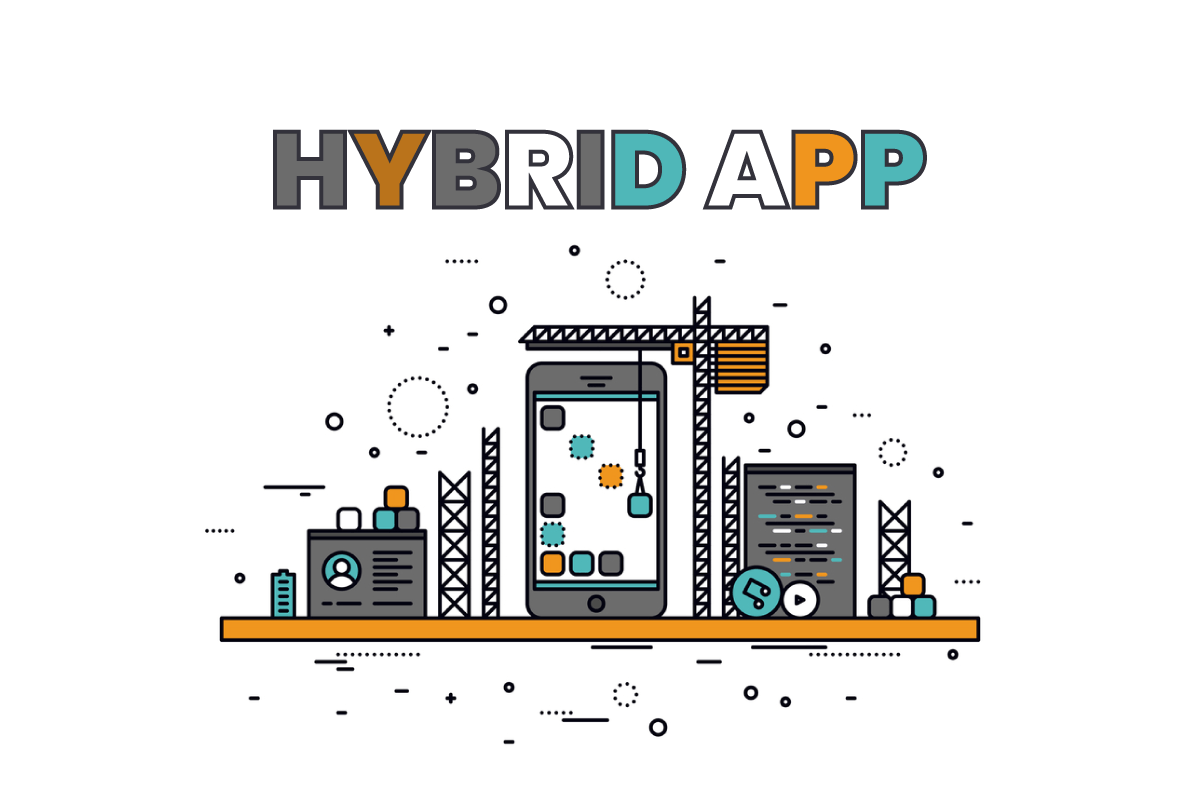In an era where digital presence is indispensable, businesses and developers face the quintessential dilemma of choosing the right approach to mobile app development for eCommerce. Amidst the diverse spectrum of development methodologies, Hybrid App Builders have emerged as a groundbreaking solution, harmonizing the benefits of both native and web applications. This article delves into the world of Hybrid App Builders, uncovering their core principles, advantages, and the top 5 frameworks for app hybrid.
Table of Contents
Overview of the Hybrid App
A hybrid app is a single application that seamlessly works on different platforms and a considerable choice of hybrid app builder when choosing mobile apps. Further, hybrid apps make it faster to reserve a spot in the app store market.
Definition of a Hybrid App
A Hybrid App is a type of mobile application that combines elements of both native apps and web applications. Essentially, it’s a web app built using HTML5, CSS, and JavaScript, but it is encapsulated within a native application. Through this native container, which uses a mobile platform’s WebView, the app can access device-specific hardware features like the camera, accelerometer, contacts, and more, which are typically not available to traditional web apps.

The key characteristic of a Hybrid App is that it is developed using a single code base, which can then be deployed across multiple platforms, such as iOS, Android, and Windows Phone. This is in contrast to native apps, which require separate development efforts for each platform.
Hybrid Apps are popular because they allow developers to write code for a mobile app once and still accommodate multiple platforms. This not only reduces development time and cost but also simplifies the maintenance and update process. Frameworks like Apache Cordova (formerly PhoneGap), Ionic, React Native, and Xamarin are commonly used for building Hybrid Apps, providing a layer of abstraction that allows the app to access native platform features.
Benefits of Using a Hybrid App
In the inception of mobile app development, the number of hybrid app launchers and hybrid app makers has gradually increased due to the advancement of an open-source hybrid app. Hybrid app builder has watched hybrid application architecture peak as enterprises understand hybrid mobile app’s benefits. The following are some outstanding benefits of going hybrid:
Enhanced App Integration
The open-source hybrid app enables you to combine different techniques and resources to work on an all-encompassing codebase. That codebase invariably works on different platforms. This hybrid app toolkit enables many task supports and custom services to users.
This integration extends to various features such as camera, GPS, contacts, and more, making the user experience seamless and intuitive. Unlike web apps, which have limited access to a device’s native features, hybrid apps can leverage the full potential of the hardware, enhancing functionality and user interaction. This deeper integration also allows for features like push notifications and offline access, further bridging the gap between native functionality and web app flexibility.
Highly Scalable
Built on universal web technologies like HTML, CSS, and JavaScript, they can be easily adapted and scaled to a variety of platforms and devices.
This scalability is not just limited to different operating systems like iOS and Android but also extends to newer devices and screen sizes. The flexibility to update and adapt quickly to different environments makes hybrid apps a future-proof solution in the rapidly evolving mobile landscape.
Low Development and Maintenance Cost
A hybrid app creator can persuade enterprises to go hybrid because of its lower cost than a native app. The one code for all platforms facility will help a hybrid app builder save a significant cost. Since these apps share a single codebase across multiple platforms, the need for developing separate code for iOS, Android, and other systems is eliminated.
This unified development approach not only cuts down the initial development time and cost but also simplifies the update process. Maintenance becomes easier and more cost-effective as changes and bug fixes are made in one central codebase and reflected across all platforms.
Larger Reach
Hybrid apps enable businesses to reach a larger audience with less effort. By being able to run on multiple platforms from a single codebase, these apps significantly increase market penetration.
This is especially beneficial for businesses looking to establish a presence across diverse mobile ecosystems without the need for multiple versions of their app. The ability to distribute hybrid apps through popular app stores like Google Play and the Apple App Store further enhances their visibility and accessibility to a broad user base.
Top 5 Frameworks for Hybrid App Builder
The landscape of hybrid app development is rich with frameworks that enable developers to create versatile and efficient applications. Among these, three stand out for their robust features, ease of use, and strong community support. These top hybrid app builder frameworks are:
React Native
React Native, born from a Facebook-organized hackathon, swiftly transitioned from a project aimed at enhancing Facebook’s own hybrid app experience to a global phenomenon in the app development world. Its ascent was meteoric, as evidenced by its ranking as the second-highest in terms of contributor count on any GitHub repository in 2018.

This framework has been the backbone of numerous high-profile apps, including Facebook, Shopify, Tencent, Wix, Instagram, Uber Eats, Tesla, and Walmart, underscoring its widespread adoption and versatility. Below are some key features of React Native that gain the attention of a hybrid app builder.
Creating native apps for Android and IOS using React
React Native is considered a best-in-class JavaScript library for building user interfaces. A hybrid app builder can use it in your existing Android/IOS projects or create a whole new app from scratch.
Written in JavaScript and rendered with native code
React primitives render to native platform UI. It means that your hybrid app will use the same native platform APIs other apps do. Moreover, with React Native, a hybrid app builder can create platform-specific versions of components so a single codebase can share code across platforms.
Native development for every hybrid app builder
React Native provides a key set of hybrid application development tools that map directly to the native UI building blocks. With React Native, every hybrid app builder can create apps without compromising experiences.
Seamless cross-platform React
Native uses native code and interacts with native APIs via React Native’s declarative UI paradigm and JavaScript. This will help hybrid app builders work as a team at a faster speed.
Iconic Framework
The Ionic Framework, established in 2013, is a seasoned player in the realm of hybrid app development, boasting a legacy of over 5 million apps in over 200 countries around the world created using its platform. Designed with the ambition to streamline hybrid app development, Ionic stands out for its ability to offer cross-platform development while providing platform-specific UI elements, ensuring that apps maintain a native look and feel on different devices.

It is trusted by many enterprises such as BMW, NASA, NHS, Airbus, Sworkit, Instant Pot, Shipt, Untappd, etc and many notable case studies utilize Ionic to develop their hybrid apps. Ionic’s key features highlight its commitment to delivering efficient, cross-platform solutions with a native touch, making it a go-to choice for developers aiming to build versatile and user-friendly hybrid applications. Therefore, Iconic has some key features as follows:
Building fast hybrid apps
Iconic allows you to build hybrid apps and run fast on all of the latest mobile devices. To make this, Iconic uses hardware-accelerated transitions, pre-rendering, touch-optimized gestures, and AOT compiling.
Building with your favorite framework
With Iconic, your hybrid app Angular will be based on AngularJS meaning that a hybrid app builder can create complex and extraordinary apps. Iconic can integrate seamlessly with all high-quality front-end frameworks such as React, Vue, and JavaScript. Therefore, you can easily customize your hybrid app design.
Simply and declarative UI component design
Iconic uses components written in HTML, CSS, and JavaScript, making it easier to build modern and high-quality UIs.
Access core native device functionality
Iconic provides a rich library of more than 120 native device plugins for accessing Bluetooth, Camera, Location, and others, or dive deep into the native SDK when you need it.
Xamarin
Xamarin, initially an open-source development platform known as Mono, was acquired by Microsoft in 2006 and has since evolved into a widely acclaimed SDK for hybrid app development. As an open-source framework, Xamarin has cemented its place as a favorite among hybrid app builders, largely due to its use of the C# language for app coding across all platforms. This uniformity in coding, coupled with the ability to utilize .Net features and access native APIs, significantly enhances the functionality and performance of apps developed with Xamarin. It is free and applicable to both Android and IOS.

Xamarin’s prowess and reliability have attracted partnerships with numerous enterprises, including UPS, Alaska Airlines, BBC Good Food, FreshDirect, BBVA, Olo, and Taxfyle. These collaborations underline Xamarin’s competence in delivering robust, cross-platform applications with native-level performance, thereby making it a top choice in the hybrid app development landscape.
Native and performance
With Xamarin, you can design a uniform UI across platforms or build a native user interface. Xamarin offers the full spectrum of functionality including underlying platform, device, and leveraging platform-specific hardware acceleration.
Cross-platform
As a part of the vibrant .NET ecosystem, through Xamarin, your hybrid app can connect to millions of developers worldwide. You can use your favorite hybrid app development tools in Xamarin’s library.
Build stunning cross-platform user interfaces
Xamarin is an open-source UI framework for a hybrid app builder to use on IOS, Android, and Windows from a single shared codebase.
Mobile to cloud with Azure
Every application needs a scalable and versatile back-end. Xamarin provides Azure for enterprises to power their mobile front-end. Azure uses the same language, code, and tool to develop apps for mobile, cloud, and server.
Flutter
Flutter, introduced just over a month ago, is Google’s formidable foray into the hybrid app development arena and is already shaping up to be a game-changer. Touted as a true future-proof platform, Flutter’s impact on the hybrid app industry is profound, with many regarding it as a new benchmark in the field.

Created primarily for Google’s Fuchsia OS, Flutter’s standout feature is its ability to use a single codebase to develop applications for multiple platforms. This capability is facilitated by its unique programming language, DART, which is a blend of Java and Kotlin, offering the best of both worlds in terms of efficiency and readability.
Unparalleled cross-Platform capability
Flutter’s ability to operate across various platforms, including Android, iOS, Windows, and more, is simply unparalleled. While it’s chiefly designed for Fuchsia, its versatility shines through its compatibility with other major platforms, making it an incredibly potent tool for developers looking to reach a wide audience.
Tried and tested by industry giants
Flutter’s credibility is bolstered by its adoption by not just Google but also other tech giants like Alibaba, which use Flutter for certain functionalities. This endorsement by major players serves as a testament to Flutter’s robustness and reliability.
Impressive application speed
For a hybrid app framework, Flutter excels in delivering impressive app speed. This performance aspect is crucial as it ensures a smoother, more responsive user experience, which is often a challenge in hybrid app development.
Seamless and futuristic UI design
Apps developed on Flutter are known for their aesthetically pleasing and user-friendly design. The framework makes it easier to implement futuristic design elements, allowing developers to create applications that are not just functional but also visually appealing and engaging.
PhoneGap/Apache Cordova
Apache Cordova, originally known as PhoneGap, has been a significant player in the hybrid app development platform since its inception by Nitobi in 2009. Gaining popularity as PhoneGap, it was acquired by Adobe in 2011 and rebranded to its current name.

Although initially limited by the requirement of using a Mac for iOS app development and Windows for Windows apps, the latest versions of Cordova have overcome this limitation. This evolution is attributed to Adobe’s introduction of a ‘cloud compiler’, enabling true cross-platform app builds. Cordova utilizes CSS and HTML5 for rendering, along with JavaScript for logic, and the cloud compiler efficiently transforms this code into functional apps.
Embracing HTML5
Cordova’s use of HTML5 is one of its most compelling advantages. HTML5’s popularity and widespread acceptance make Cordova accessible to a vast pool of developers, including those who are venturing into app development for the first time.
Simplified app design process
Designing an app can often be more challenging than coding its logic. Cordova addresses this challenge by simplifying the app design aspect. This ease of design allows developers to focus more on the functionality and user experience, making the development process more efficient and less daunting.
Accelerated development cycle
The speed and ease of developing apps with Cordova are standout features. This framework enables developers to build apps swiftly, reducing the time from concept to deployment.
The rich repository of plugins
Cordova’s extensive array of plugins is a major asset, enhancing the framework’s functionality and versatility. The active community around Cordova continually contributes a plethora of plugins, providing developers with an ever-expanding toolbox to augment their apps.
Conclusion
The hybrid app is one of the customizable technology stacks that help enterprises pave the way to their success. Hybrid apps are more scalable at lower development and maintenance costs than native apps. It also has a larger reach. That is the reason why hybrid apps are becoming more and more popular. There are many hybrid app frameworks for a hybrid app builder to choose such as React Native, Ionic, Xamarin, etc. Each framework has its features in functionality and structure. Based on the budget and the nature of your eCommerce operation, you can easily choose the right one for you.
To stay ahead in the dynamic world of app development and receive more insightful updates and tips, be sure to subscribe to our newsletter at the end of this exploration into the world of mobile applications and eCommerce.











